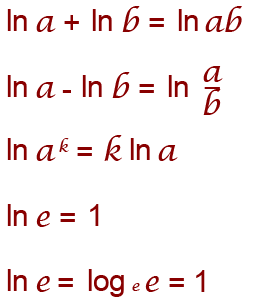Natural Logarithms
The Natural Logarithms are very similar to the common logarithms, the difference is that you have a base e that is constant. The natural logarithm is the logarithm to the base e, where e is an irrational constant approximately equal to 2.718281828. The natural logarithm is generally written as ln(x), loge(x). The natural logarithm of a number is the power to which e would have to be raised to equal to that number. For example; the In(54.59815…) is 4 because e4 is equal 54.59815… You might get a function like the following;
![]()
You can turn this function into a function involving logs, to do so you simply take each side of the function to a log with base e. You just simply add the loge at the beginning of each side as below as then you’ll be able to find the logarithm.
![]()
Use the rules of logs to convert one of the sides with logeex using the logs rules to give you;
![]()
Now simplify, You know that;
![]() …according to the logs rules. That leaves you with;
…according to the logs rules. That leaves you with;
![]()
![]()
In general we say that;
![]()
The rules of logs also apply to natural logs as you will realise below;


Thank you v.much